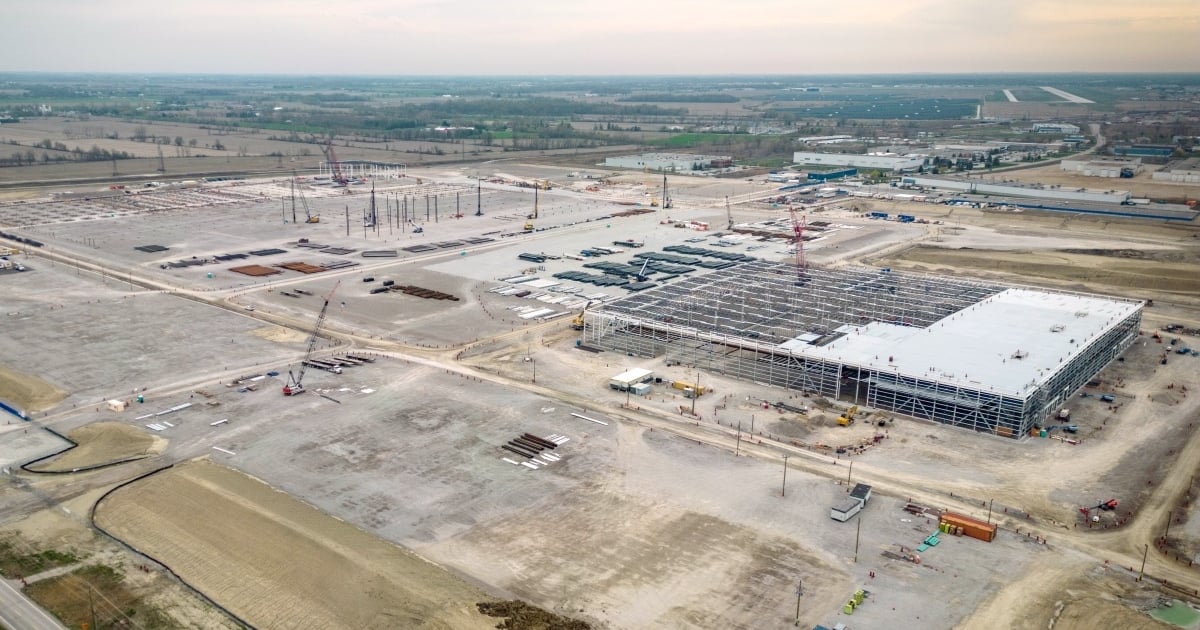
Stellantis and LG Energy on Monday ceased some construction of its planned electric-vehicle battery factory in Canada as it continues to spar with the federal government over financial assistance.
The automaker is accusing Ottawa of reneging on a previously made promises regarding the plant in Windsor, Ontario, which borders Detroit.
“As of today, the Canadian Government has not delivered on what was agreed to therefore Stellantis and LG Energy Solution will begin implementing their contingency plans. Effective immediately, all construction related to the battery module production on the Windsor site has stopped,” Stellantis said in a statement Monday.
The C$5 billion ($3.7 billion USD) plant, slated to begin operations in August 2024, will be able to produce 45 gigawatt-hours of lithium-ion cells and modules a year to feed the automaker’s assembly operations in Canada and the U.S., Stellantis previously said.
Cells and modules are two separate parts, both to be assembled at the Windsor site.
Framing of the module portion of the factory is partially complete. Construction of the cells section of the facility is in its early stages.
Some activity continues on the 220-acre site.
At the time of the plant’s announcement, in March 2022, Canada’s Innovation Minister Francois-Philippe Champagne described the deal, which included about C$1.48 billion from LG and undisclosed contributions from federal and provincial governments, as the largest ever in the Canadian auto sector.
‘WE CONTINUE TO NEGOTIATE’
A spokesperson for Champagne said Friday the “auto industry is crucial to the Canadian economy and to the hundreds of thousands of Canadian workers.”
“We continue to negotiate in good faith with our partners. Our top priority is and remains getting the best deal for Canadians,” the spokesperson said.
Earlier, Finance Minister Chrystia Freeland said Canada was having “good discussions” with Stellantis, after a newspaper reported that automaker was looking for better government subsidies than originally offered by Ottawa.
“We are, as the federal government team working very, very hard on Stellantis, we’re very, very focused on it,” Freeland told reporters on a call after meetings with G7 partners in Japan.
Stellantis is now threatening to pull the plug on the module portion of the plant unless the deal with the government is sweetened to the level Volkswagen received this year, The Toronto Star newspaper reported Friday, citing unnamed sources.
Canada’s deal with Volkswagen for a battery gigafactory in St. Thomas, Ontario, worth up to C$13 billion in incentives and announced in April, is the biggest single investment ever in the country’s EV supply chain.
The federal government has committed to provide up to C$13.2 billion in manufacturing tax credits through 2032, while Europe’s largest carmaker is investing up to $7 billion to build the plant St. Thomas, Ontario.
The incentives nearly match those in the U.S. Inflation Reduction Act, which includes a US $10 per kWh incentive for battery module production.
However, Volkswagen will receive no federal support for battery modules made in St. Thomas., according to Hans Parmar, a spokesperson for Innovation, Science and Economic Development Canada.
The planned St. Thomas investment is only for cells, Parmar told Automotive News Canada. The IRA incentive for those is US $35 per kWh of cell production.
“The U.S. Inflation Reduction Act puts Canadian battery production at a significant disadvantage. Corresponding support is needed to level the playing field if Canada is going to be part of the emerging North American battery supply chain,” said Brian Kingston, head of the Canadian Vehicle Manufacturers’ Association, which represents the interests of and lobbies on behalf of the Detroit Three in Canada.
URGED TO END DISPUTE
Meanwhile, Windsor Mayor Drew Dilkens and Unifor, the union representing Detroit 3 hourly workers in Canada issued separate statements on the weekend, urging the two sides to resolve their dispute.
“Government and Stellantis are playing a high-stakes game that is betting the livelihoods of tens of thousands of Canadian autoworkers,” said Unifor National President Lana Payne. “Commitments were made and Unifor and our members fully expect that all parties live up to them.”
Dilkens laid the blame on Ottawa. “The entire deal is in now in question due to the federal government not fulfilling their commitments, jeopardizing not only the completion of the EV plant, but also our efforts to attract additional investment to the region.”
The city, he noted, “played a crucial role … assembling land and providing funding to support servicing and preparing the lands for the facilities.”
Flavio Volpe, president of the Automotive Parts Manufacturers’ Association, also weighed in, expressing optimism that the investment will proceed.
“Fortunately, both parties are very committed to the city, the supply chain and it’s workers,” Volpe said in a tweet posted Saturday. “I expect that we will see this through.”
What has been exposed, he added, is “a tough negotiation gone public. When Canada landed this incredible investment, the USA countered with the biggest subsidy offer in automotive history. Stellantis is addressing its fiduciary responsibility to its shareholders as it should.”
With files from Reuters and David Kennedy of Automotive News Canada.

